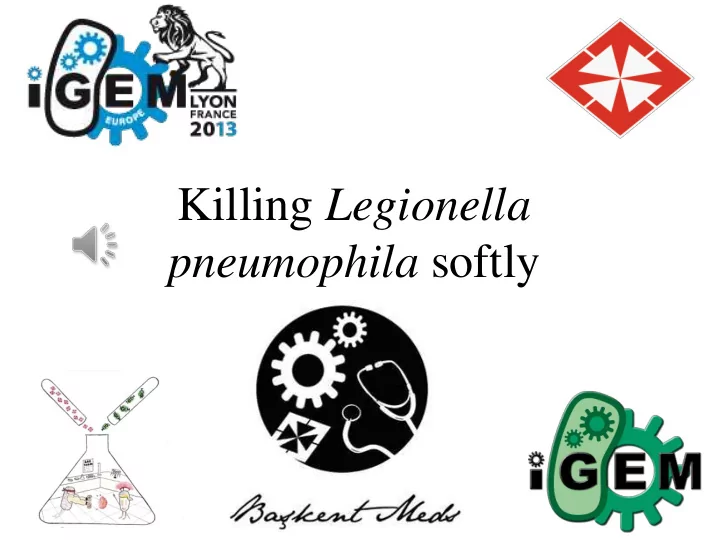

Killing Legionella pneumophila softly
Killing Legionella pneumophila
Killing Legionella pneumophila softly Başkent Meds
Legionella pneumophila – G(-) bacteria – Infectious agent of atypic pneumonia; Legionellosis case1study.wikispaces.com
LEGIONNELLOSIS: CLINICS • Symptomatic infections are primarily observed in lungs • Two forms of the disease: PONTIAC FEVER LEGIONNAIRES’ DISEASE
IDENTIFICATION • Clinical diagnosis of the disease • Methods used for determining contamination risk at water systems Selective medium culturing ELISA QPCR
PROTECTION & PREVENTION • Environmental Legionella monitorization • Prevention by disinfection: – Thermal eradication method (66 ° C) – Hyperchlorination – Ozonation – UV – Copper-silver ionization
Legionella pneumophila Ready for biofilm? No, we aren’t “talk” to each other enough yet! Divide! ?
Quorum Sensing
Legionella quorum sensing (lqs) autoinducer synthase response regulator sensor kinase Tiaden A, et al. Environ Microbiol, 12: 1243-59, 2010.
The system which we are trying to develop is E. coli cells that can recognize L. pneumophila specifically at species level by using its QS mechanism, and respond to that recognition by producing and secreting anti-Legionella peptide which is a peptide produced by some Staphylococcus strains.
Our system is composed of 3 expression “cassette s ” . In the first cassette; a translational lqs response unit is generated with lqsS and lqsR system elements Source of lqs region is pNT-1 plasmid. (Cellular Microbiol 9:2903-20, 2007) .
The LqsR and LqsS genes have illegal restriction enzyme recognition sites inside their coding regions. So that composite part was amplified with primers having SpeI cutting sites, and cloned into the downstream of a constitutive promoter in the pSB1C3.
In the second cassette; anti-legionella unit Biobrick is transcribed under lqsR promoter which is regulated by response regulator lqsR itself. Promoter part was designed as a Biobrick. The regulatory part also contains an RBS. LqsR promoter
Anti-legionella (Warnericin RK) peptide induces channel formation at a low concentration, and a detergent-like solubilization of the membrane at high concentration Verdon et al. Peptides 30:817-23, 2009.
ORF for anti-legionella peptide specifically encodes for a 22 amino acid peptide. Anti- legionella unit is a composite Biobrick for suitable suffix and prefix regions. It contains a PelB leader sequence in the upstream of the anti-legionella peptide ORF to direct the peptide outside the cell. Source is synthetic oligonucleotides. Anti-legionella PelB leader oligonucleotide sequence E-X 66 bp 66 bp S-P Verdon et al. Biophy J 97:1933-40, 2009.
The third cassette contains febA L8T pore protein which is responsible for diffusion of synthesized proteins through cell membrane to outside of the cell. It is transcribed under a constitutive promoter and with RBS in the 5' region of ORF. Source of the parts is the iGEM distribution kit.
Our models A B D C
Safety
Future plan - Complete all system - Kill switch - Detection system - How are we planing to use it - Biofilm formation on contaminated surfaces -Our recombinant cells can be entrapped into a system and placed in contaminated area
Human Practice 2012-2013 Baskent University Medical School Symposia
Presentation for Synthetic Biology Day organized by METU iGEM Team
Presentation for organization of the ITU iGEM Team
Brief on High School iGEM to an International Baccalaureate School; Bilkent High School
Özgür Özlem Feride Berkhan Didem Mert Yunus Başak Cansu Sevecen Burak
This study was approved by Baskent University Institutional Review Board (Project No’s : DA12/05 and DA13/06) and supported by Baskent University Research Fund.
Our Sponsors
Recommend
More recommend